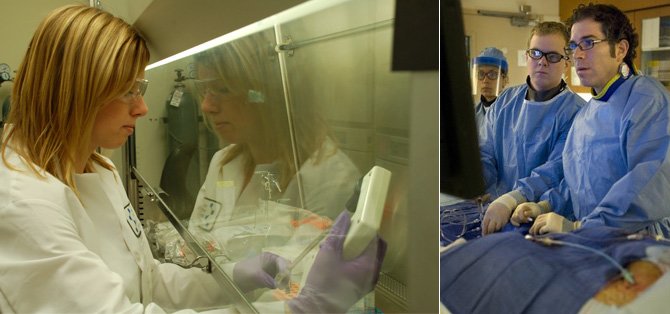Translational Research
 The power of translational research – from the laboratory bench to the patient’s bedside –is illustrated by Scripps Translational Science Institute scientists’ research on clopidogrel pharmacogenomics. At left, Lauren Ariniello in the lab, and at right, Matthew Price, M.D., in Scripps Green Hospital’s cardiac catheterization patient care facility.
The power of translational research – from the laboratory bench to the patient’s bedside –is illustrated by Scripps Translational Science Institute scientists’ research on clopidogrel pharmacogenomics. At left, Lauren Ariniello in the lab, and at right, Matthew Price, M.D., in Scripps Green Hospital’s cardiac catheterization patient care facility.
Clinical and laboratory studies that have the strongest potential for driving progress in individualized medicine and improving health care outcomes for individual patients are supported by the Scripps Translational Science Institute (STSI) and Scripps Genomic Medicine (SGM).
STSI sponsors highly innovative research proposals that bring together clinical investigators and laboratory scientists based at one or more of the institute’s participating institutions. These pilot/methodological studies embrace a broad range of translational science topics, from tRNA synthetase as a novel therapeutic for melanoma to an artificial chromophore to restore vision. For more examples, please visit Awarded Pilot Studies.
Six of the pilot/methodological studies that were awarded in fall 2008, the first year of the program, are now, multi-year investigations sponsored by National Institutes of Health RO1 grants.
Under SGM, scientists have established a robust system for systematically discovering and characterizing DNA variants associated with health and diseases. The five key research areas of SGM, which is part of STSI, are:
- Pharmacogenomics
- Diabetes
- Cancer
- Biomarkers
- Healthy Aging
Several of the investigations in these five areas are described in Research Highlights.
While SGM studies are funded by NIH grants, not-for-profit foundations as well as industry, STSI’s pilot/methodological studies are funded through the institute’s NIH Clinical and Translational Science Award (CTSA).
